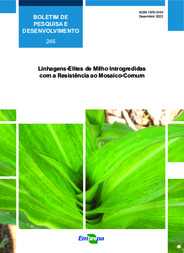Linhagens-elites de milho introgredidas com a resistência ao mosaico-comum.
Linhagens-elites de milho introgredidas com a resistência ao mosaico-comum.
Autoria: SOUZA, I. R. P. de; PINTO, M. de O.; GUIMARAES, P. E. de O.; GUIMARAES, L. J. M.; TRINDADE, R. dos S.
Resumo: RESUMO - No Brasil, a virose Mosaico-Comum, que afeta o milho, é causada pela espécie de potyvirus Sugarcane mosaic virus (SCMV). Os danos ocasionados por essa virose serão maiores quanto mais cedo a infecção se estabelecer, podendo atingir perdas consideráveis na produção em genótipos suscetíveis. Para um controle eficiente da doença, fazem-se necessários o desenvolvimento e a utilização de cultivares resistentes. O objetivo do presente trabalho foi a introgressão da resistência ao Mosaico-Comum em duas Linhagens-Elites de milho suscetíveis, 5100290-11, grupo heterótico Flint (F), e 5702955, grupo heterótico Dent (D), empregando, como fonte de resistência, linhagens dos respectivos grupos heteróticos. No processo de introgressão da resistência, os indivíduos da geração F1, resultantes do cruzamento entre o parental suscetível e o doador, foram resistentes, segregando nas etapas seguintes. Os indivíduos das gerações de retrocruzamento e das autofecundações subsequentes foram submetidos às inoculações com a estirpe brasileira de Sugarcane mosaic virus (SCMV), sempre selecionando as plantas fenotipicamente resistentes. A partir da segunda geração de retrocruzamento (RC2), as plantas apresentando acima de 90% de recuperação do genoma foram selecionadas e submetidas a gerações de autofecundação para obtenção das respectivas linhagens na versão resistente. A versão resistente das Linhagens-Elites em RC2 F4 foi testada em casa de vegetação e em campo, não mais apresentando segregação. A geração RC2 F5 obtida da autofecundação dessas linhagens será utilizada no desenvolvimento de híbridos de milho. ABSTRACT - In Brazil, the potyvirus species Sugarcane mosaic virus (SCMV) causes the maize common mosaic disease. The damage caused by this virus disease will be greater the earlier the infection is established, reaching considerable losses in production in susceptible genotypes. For an efficient control of the disease, the development and use of resistant cultivars are the most efficient strategies. The objective of the present work was the introgression of resistance to maize common mosaic in two maize elite inbred lines susceptible to the disease, 5100290-11 heterotic group Flint (F), and 5702955 heterotic group Dent (D), using, as a source of resistance, lines of the respective heterotic groups. In the introgression resistance process, individuals of the F1 generation, resulting from the crossing between the susceptible parent and the donor, were resistant, segregating in the following steps. Individuals from BC generations and subsequent self-fertilizations were submitted to inoculations with the Brazilian strain of Sugarcane mosaic virus (SCMV), always phenotypically selecting the resistant plants and conducting them individually. From the second generation of backcross (BC2 ), the plants showing more than 90% of genome recovery were selected and submitted to generations of the self-fertilization, in order to obtain the respective lines in the resistant version. The resistant version of the elite lines in BC2 S4 was tested in a greenhouse and at field, without showing segregation. The BC2 S5 generation obtained from the self-pollination of these lines will be used in the development of maize hybrids.
Ano de publicação: 2022
Tipo de publicação: Folhetos
Unidade: Embrapa Milho e Sorgo
Palavras-chave: Doença de Planta, Marcador Molecular, Melhoramento Vegetal, Potyvirus, Retrocruzamento, Sugarcane mosaic virus, Vírus, Zea Mays
Observações
1 - Por padrão são exibidas publicações dos últimos 20 anos. Para encontrar publicações mais antigas, configure o filtro ano de publicação, colocando o ano a partir do qual você deseja encontrar publicações. O filtro está na coluna da esquerda na busca acima.
2 - Para ler algumas publicações da Embrapa (apenas as que estão em formato ePub), é necessário ter, no celular ou computador, um desses softwares gratuitos. Sistemas Android: Google Play Livros; IOS: iBooks; Windows e Linux: software Calibre.
Acesse outras publicações
Acesse a Base de Dados da Pesquisa Agropecuária (BDPA) para consultar o acervo completo das bibliotecas da Embrapa.

